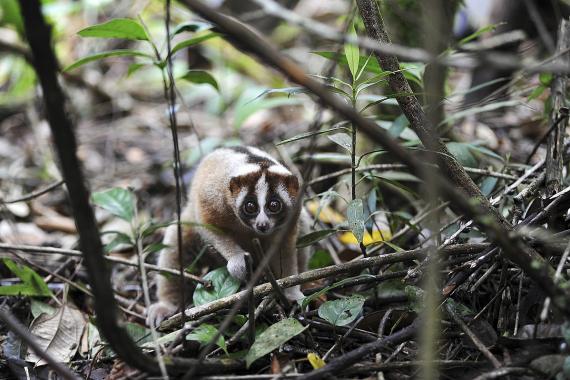The Little Fireface Project
Completed initiative 2015
Published

Javan slow loris (Photo "File:Merangkak.jpg" by Jefri Tarigan is licensed under CC BY-SA 4.0)
Slow lorises, small nocturnal primates found throughout Southeast Asia, are threatened by the illegal trade for pets, medicines, and tourist photo props. The Little Fireface Project educated the local community about the ecological importance of the Critically Endangered Javan slow loris (Nycticebus javanicus) and instilled a sense of pride in local people who live alongside with and are essential players in the conservation this species.
Lead

Location
Cipaganti village, Garut District, lies in the foothills of Gunung Puntang, which is part of the mountain range containing the active volcano Gunung Papandayan. While Gunung Papandayan is recognised as a nature reserve, the agricultural areas surrounding the nature reserve rely wholly on local people for their protection.
The villagers of Cipaganti, numbering just over 3000, are ethnically Sundanese and are predominantly Muslim.
Critically Endangered Javan slow loris is endemic (Nycticebus javanicus) to Java, and with less than 10% of natural forest remaining, Javan slow lorises are dependant on local people for their survival, and in the Gurat district, this species occurs in relatively high densities.
The poaching and wildlife trade problem
Species affected Javan Slow Loris Nycticebus javanicus
Products in tradeSlow lorises, small nocturnal primates found throughout Southeast Asia, are threatened by the illegal trade for pets, medicines, bushmeat and tourist photo props.
Overview of the problem
Over the last few decades, slow lorises have been regularly recorded in the open wildlife markets in the region and in 2007, the demand for lorises caused them to be the first primates since 1986 to be transferred to CITES Appendix I to curtail international trade.
Local trade can be more difficult to monitor and enforce, yet we know that lorises are regularly traded for domestic use despite their legal protection in the 14 range countries where they occur and this trade clearly and intensely impacts the Javan slow loris.
Interviews throughout Java, including with hunters, showed that much of the trade at its initial stage in the chain was done for minimal profit, as a secondary event to other activities such as agriculture.
The anti-IWT initiative
The Little Fireface Project engages with the local community to protect the Javan slow loris from poaching and IWT through education and empowerment.
In addition to stopping trade locally, a major goal of the project was to encourage people to not keep slow lorises as pets, to understand the importance of slow lorises in the ecosystem, and to be able to identify slow lorises rescued from the illegal wildlife trade. This was achieved by training on site, through social networking, and through various work with illegal wildlife traders.
Social networking was used to present news about our research, to announce events, to provide petitions and information on how to report illegal Internet activity regarding slow lorises, and to collect information about illegal wildlife trade. A newsletter produced tri-annually for its subscribers (1462 members).
A set of law enforcement training materials were developed on how to identify slow lorises in the illegal trade.
To raise awareness of nocturnal animals, such as the Javan slow loris, and their conservation, whilst also building a sense of pride and ownership, a number of events that included local people were held. These included 'socialisation events', such as public lectures and films and live music and dancing festivals; competitions, such as football tournaments and talent competitions; and formal lectures and seminars, including lectures by Forestry and Wildlife Departments and a public lecture on slow lorises by a local imam.
At these event materials promoting the species - how special it is - and opportunities for the community to 'connect' with the animal, including the importance the local community is for its conservation, were provided to attendees. For example:
- 'what makes you proud of Cipaganti photo booth',
- 'I'm proud of slow loris' t-shirts and other clothing and badges decorated with slow lorises,
- a related film was shown on local TV,
- calendars printed about the slow loris, the project and featuring people from the community.
Education was an important component of the initiative. A wide variety of educational opportunities were provided including a weekly Nature Club in Cipaganti village with 20–59 children; biweekly Drama Club and Book Club with 15–20 children; construction of a village school for national curriculum and nature teaching; and region-wide assessment of a children’s book about slow lorises. Project personnel visited schools and provided lessons about the species, its ecology, and conservation.
The strategy
Increasing livelihoods that are not related to wildlife
Renovate football pitch and provide new balls & nets; uniforms & trophies with slow loris and other nocturnal mammals.
Construction of a village school for national curriculum and nature teaching.
Build/and or support sense of community ownership or stewardship
Further detail- 'what makes you proud of Cipaganti photo booth',
- 'I'm proud of slow loris' t-shirts and other clothing and badges decorated with slow lorises,
- an associated film was shown on local TV,
- calendars printed about the slow loris, the project and featuring people from the community,
- a public lecture on slow lorises by a local imam.
Improving education and awareness
Further detailFrom the beginning of the project, informing people about why we were working in Cipaganti and why the slow lorises are important was vital and reached 1000s of people in the village as well as in surrounding areas through a number of methods, including:
- formal lectures and films, distribution of educational material,
- handing out stickers of lorises (and civets) at local petrol stations,
- lectures by Forestry and Wildlife Departments.
Has the initiative made a difference?
The initiative appears to have slowed the poaching of the Javan slow loris from these forests. Only one monitored animal disappeared in 'mysterious' circumstances - other found animals were taken to the project's personnel. There is also an indication that the project has influenced local villagers further afield.
What works and why
In our project, we are members of the village and active members of the community. It has been vital to gain their trust and to incorporate their needs into our conservation strategy. At the same time, it is important to connect the small community where we are working with the rest of the world, to allow them to gain pride and empathy for the special species that share their farms, fields, and remnant forests with them.
Factors for success
Sufficient time investment in building relationships and trust between the initiative and local communities
Organisers, donors and partners
Funders over the years: Amersfoort Zoo, Augsburg Zoo, Blank Park Zoo, Born Free Foundation, Brevard Zoo, Chicago Zoological Society/Chicago Board of Trade (CBOT) Endangered Species Fund, Cleveland Zoo and Zoo Society, Columbus Zoo, Conservation International Primate Action Fund and Margot Marsh Biodiversity Fund, Cotswold Wildlife Park, Disney Worldwide Conservation Fund, Henry Doorly Zoo, International Primate Protection League, Lawrence Jacobsen Conservation Award, Leverhulme Trust RPG-084, Longleat Safari and Adventure Park, Lush Charity Pot, Mazuri Zoo Feeds, Memphis Zoo, Mohamed bin Zayed Species Conservation Fund, Nacey Maggioncalda Foundation, National Geographic (GEFNE101- 13), People’s Trust for Endangered Species, Phoenix Zoo, Primate Action Fund, Primate Conservation Inc, Primate Society of Great Britain, Royal Geographic Society, Shaldon Wildlife Trust, Shepreth Wildlife Park, Sophie Danforth Foundation, Quantum Conservation Inc, University’s Federation for Animal Welfare Whitley Wildlife Conservation Trust, ZACC, and ZGAP.
For further information contact (peoplenotpoaching@gmail.com).